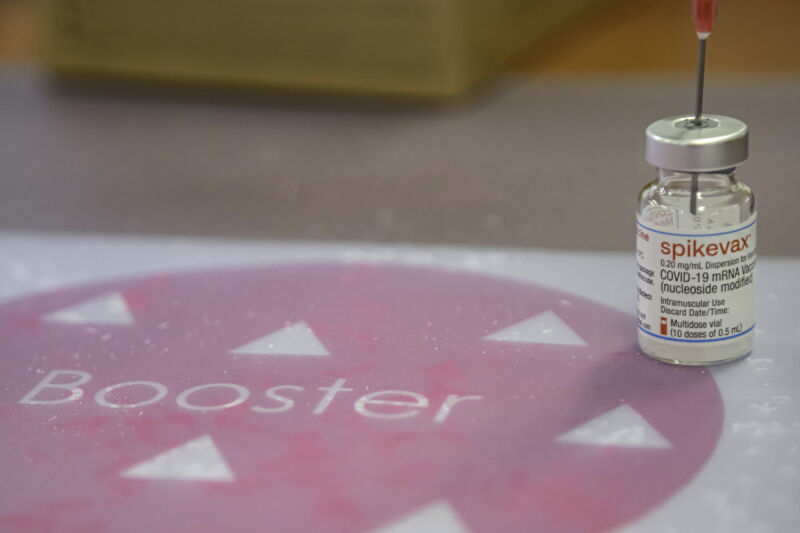Booster protection from omicron hospital stay dips from 91% to 78%

COVID-19 booster doses are largely holding up against the ultratransmissible omicron variant, despite the fact that protection inevitably wanes over time, according to a recent study published by the Centers for Disease Control and Prevention.
Still, with the boosters’ inevitable waning and omicron’s ability to dodge some immune responses, fourth doses may be needed in the future to sustain or improve protection against COVID-19, the study authors note.
The study, published in the CDC’s Morbidity and Mortality Weekly Report, estimated booster effectiveness against severe disease and hospitalizations. It charted a slight decline in booster effectiveness from less than two months after a booster dose to over four or five months after the third jab. The latter time frame is the latest for which there is available booster data, based on when the shots became widely offered. The study collected data from patients in 10 states, including from over 240,000 visits to emergency rooms or urgent care centers and more than 93,000 hospitalizations.
Overall, booster doses greatly improved protection against omicron and largely held over time. In people who had a third shot of any of the mRNA vaccines within two months, the booster was estimated to be 91 percent effective against hospitalization for an omicron infection. That vaccine effectiveness estimate dropped to 88 percent if a person was two-to-three months out from their booster. Effectiveness dropped to 78 percent four or more months out.
In terms of protecting against an omicron-caused emergency room or urgent care visit, a third shot of any mRNA vaccine given within two months was 87 percent effective. That effectiveness dipped to 81 percent two-to-three months after the booster and then to 66 percent at four or more months after the shot. The study also had data on 18 COVID-19 patients who were five or more months out from a third shot and needed emergency or urgent care. From those patients, the study authors estimated a vaccine effectiveness of 31 percent. However, the numbers are simply too small to make that a reliable calculation; the 95 percent confidence interval on the calculation ranged from -50 to 68.
Limitations
While that 66 percent effectiveness at four months may also seem concerning, it’s important to note that the study authors also estimated the effectiveness of just two shots. At five or more months out from two shots, vaccine effectiveness was just 37 percent against an emergency or urgent care visit for an omicron infection.
The study had a strong design. Its test-negative setup compared the odds of unvaccinated and vaccinated people testing positive for COVID-19 using models. Those models accounted for calendar week and each patients’ location, age, local virus transmission levels, immunocompromised status, additional underlying health conditions, and other factors.
But there were also several limitations. As noted above, the small amount of data on people who were five or more months out from their booster makes vaccine effectiveness estimates for that time frame unreliable. The study also was not able to distinguish between third doses and booster doses for the immunocompromised, who are recommended to get a third dose as part of their primary series and a booster dose later. People who are moderately to severely immunocompromised are recommended to get a three-dose primary series because two doses alone do not provide the same levels of protection seen in non-immunocompromised people. Thus, if the study captured immunocompromised people getting a third dose, rather than a fourth, it might skew effectiveness estimates lower.
Overall, the study authors concluded that the data made a strong argument for boosters, even if they’re not the last shots we may need. “These findings underscore the importance of receiving a third dose of mRNA COVID-19 vaccine to prevent both COVID-19–associated ED/UC [emergency department and urgent care] encounters and COVID-19 hospitalizations among adults,” they conclude. “The finding that protection conferred by mRNA vaccines waned in the months after receipt of a third vaccine dose reinforces the importance of further consideration of additional doses to sustain or improve protection against COVID-19–associated ED/UC encounters and COVID-19 hospitalizations.”
Read More: Booster protection from omicron hospital stay dips from 91% to 78%

